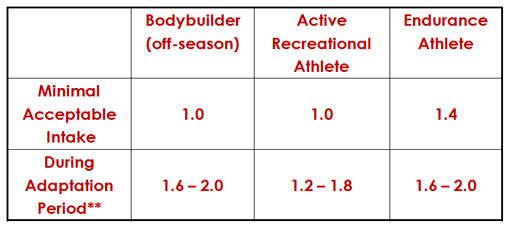Question: How many grams of protein should I be eating in a day? I'm trying to lose fat/build muscle. I read in a magazine that it's about 1gm of protein per lb of body weight.
Answer: One gram per pound of body weight is a simple equation that’s easily followed when trying to reach your fitness goals, and while on the higher side, is probably safe. The actual recommendation for someone with your goals (dieting and presumably exercising with a fat loss goal) is listed below under “active recreational athlete” and “adaptation period”. You should strive for 1.2—1.8 grams of protein per 1 kg of body weight, or .5--.8 grams of protein per 1 pound of body weight. It doesn’t hurt to get a little extra protein (e.g. 1 gm/lb) in your diet. In fact it would actually be necessary if you are trying to lose weight quickly or plan on maintaining a prolonged energy deficit as physique athletes do when preparing for competition.
More info
You should strive to get your protein from traditional foods such as lean meats, dairy, beans, etc., but if caloric limitations, availability or food likes/dislikes make it hard for you to meet these guidelines, then simply add a protein supplement with each meal or once or twice daily. Protein supplements come in powder, liquid or bar form and will give you high quality protein with minimum calories. Products in the dotFIT nutrition category can help you get high quality protein in a convenient, tasty form.
Protein Recommendations (gm/kg/day) suggested by current data for anabolic purposes*

*Presuming most energy requirements are met by dietary carbohydrates and fat
**Protein intake ranges established for variances in biological value (B.V.)
Determine your requirement by dividing your weight by 2.2. This will give you your weight in kilograms. Recommendations are based on meeting the majority of your energy needs with carbohydrates and fats – if not then protein requirements are increased (see below for more). See the Xtreme Muscle Stack: Creating the Perfect Anabolic Storm.
Increased dietary protein needs
During negative energy balance en route to competition-level body fat, protein requirements may dramatically increase.
To reach competitive levels of body fat, calorie intake is continually lowered while exercise—including cardiorespiratory, weight training and posing—is increased. (Competitive levels of body fat are generally unhealthy and impossible to maintain for prolonged periods.)
Each component of this regimen may have additive effects on protein requirements. The body’s survival mechanisms, related to energy expenditure in excess of energy intake, are probably highly active during this period, forcing a continued reduction in food intake to achieve the goal. However, due to anabolic requirements, protein intake cannot be lowered. In fact, protein intake may have to be increased in the final few weeks before competition.
During this period, the body is torn between the use of food components for energy expenditure and the support of muscle tissue. The athlete is forcing the body to achieve abnormally low levels of body fat for competition. When overall energy intake is significantly less than energy expenditure, the hormonal milieu dictates the breakdown of muscle protein for energy supply. When carbohydrate availability is limited, this effect is even more pronounced. Thus, it can be quite a challenge to balance these drastic measures with an appropriate mix of protein and carbohydrate intake. This highlights the importance of the use of dietary supplements for staving off the loss of lean body mass while low body fat is a primary goal.